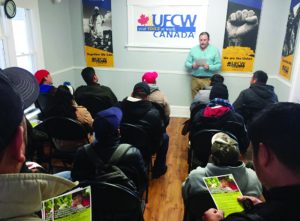Federal program provides temporary relief for abused TFWs
Federal program provides temporary relief for abused TFWs

Santiago Escobar, National Representative, UFCW Canada
June 22, 2021
By Veronica Silva Cusi
The Philippine Reporter
Maria, whose real name is being withheld here because of her precarious situation, was a farm worker in the Windsor-Essex County region in Ontario. She came to Canada in 2016 as a temporary foreign worker (TFW) with a two-year work visa.
Like many TFWs, she said she “chose Canada because it is a good country – safer. I have been dreaming to come here … to have a nice future for my family,” she said.
Little did she know that her dream will turn into a nightmare.
Maria is one of the beneficiaries of a federal program that offers a lifeline to TFWs in abusive workplace situations, albeit as a temporary solution.
The open work permit for vulnerable workers (OWP-VW) was introduced in 2019. Under the program, TFWs in abusive work conditions can apply for an OWP that will allow them to leave their workplaces without throwing away the huge investments usually associated with temporary migrant work in Canada. However, this “open work permit is a transitional measure.”
Applying for the permit is free and once approved, it is valid for one year. However, there are still features of the program that make it difficult for TFWs to consider this option.
Santiago Escobar, national representative of UFCW (United Food and Commercial Workers) Canada, said the OWP-VW program is a Band-Aid and not a long-term solution to TFWs experiencing abuse.
“What it does is give a temporary protection to those who experience abuse. But it is very problematic [in] that as a TFW you have to prove that you have been physically, sexually, financially, psychologically abused in order to obtain a work permit,” he said in an interview with The Philippine Reporter.
Filing an application is also a tedious process that some TFWs can’t do on their own.
Escobar said UFCW spends from 10 to 15 hours per case to help TFWs prepare statements and support letters, collate evidence, and more. In some cases, UFCW also has to help translate from a foreign language.
Since the start of the program, Escobar said UFCW has helped at least 140 workers from all over Canada with a success rate of 98 per cent.
One of these workers is Maria, who in a span of almost two years, had three employers as she tried to escape each precarious situation. The last one, a production and packing firm which employed her in 2019, was the last straw.
In this firm, she experienced workplace harassment and injury. The workplace verbal harassment was as insulting as the workplace physical injury as she was verbally abused by a fellow Filipino worker.
“She was so mean!” said Maria of her Filipino supervisor. “I experienced physical abuse, mental abuse.”
“She [the supervisor] called me *** and *** [words that can’t be printed here because they are vulgar],” said Maria.
A month after joining this company, she had a workplace accident with one of the machines.
“I almost died because the roller of the machine grabbed my hair,” she said. Her hair was pulled almost all the way to the scalp causing excruciating pain that lingers up to now.
Instead of giving her medical attention, Maria said she was told to keep quiet and was instead paid $56 added to her payroll to get her hair fixed in a salon.
“I said, ‘this is so insulting! Better not give me money.’” The reply she got was: “Do you want Iced Capp? I give you Iced Capp.”
She said she and co-workers also hardly had time off, forced to work long hours and days with hardly any break. On Christmas 2019, she was not allowed to attend religious services even though she argued that she has rights to practise her faith.
“I didn’t want to get another work permit again because … if I will be resigning like what’s going to happen to me?” she explained as to why she had to endure eight months of abuse. “I don’t want to go back to the street anymore. I need to pay my half million pesos [loan to the bank in the Philippines]. My mind was like ‘we will get the house again from the bank again.’”
Like many TFWs, Maria had to raise funds for a work permit. She had to put up her grandmother’s house in the Philippines as collateral for a Ph500,000 bank loan to be able to get to Canada.
Her first employer failed to give her medical help when she wasn’t feeling well. She said she was acclimatizing to Canadian weather and wasn’t feeling well. Instead of helping her, she was fired, so she was forced to live on the streets.
But getting an open work permit under the circumstances of this federal program is not all good news.
“Minority of the workers [we have helped] have been able to find an employer. [For] the majority, their work permits already expired or they are about to expire or have applied to other immigration options,” said Escobar.
“A lot of employers don’t want to hire workers that have obtained open work permits [through this program] because they know that these workers have spoken out, i.e., they complain. Employers prefer to have quiet workers that don’t complain,” he said.
TFWs with open work permits can work in any industry, though this also poses problems.
Escobar said that at the height of COVID-19 outbreaks, farm workers were hired by temporary agencies who moved these workers from one farm to the next, where labour is needed. Not only is this unstable employment, but some farm workers brought the virus with them to the next workplace.
Should the worker find another employer with an approved labour management impact assessment (LMIA), the worker will move back to a closed work permit that is tied to the employer.
Santiago said UFCW has also helped other TFWs from the same firm of Maria due to other workplace issues, such as lack of protected equipment and bad living conditions.
Recommendations
UFCW is recommending long-term solutions to put an end to similar nightmares.
Escobar said “an open work permit for all workers — at least sectoral work permit — so those in agriculture can move freely within the agricultural sector and a right to join a union so this worker will have representation, will have a voice, will have a collective agreement with meaningful safety protection.”
A 2020 report by the UFCW recommends that “union representation [be] a necessary condition of the TFW Program … and [to] end employer-specific work permits and replace them with open work permits, or at least, occupation-specific work permits.”
Urgent reforms in the report include amending the Ontario Labour Relations Act to include agricultural workers, or for the Agricultural Labour Relations Act to “be revived to truly respect the collective bargaining rights of agricultural workers.”
The UFCW report said that the number of work permits for migrant farmworkers had reached 72,000 in 2019 from only 39,700 in 2012.
——————————–
 Veronica Silva Cusi is a multimedia journalist and researcher with more than two decades of experience. She was a business journalist for 12 years with Business World in the Philippines and a journalism lecturer for 14 years at University of the Philippines. She’s been covering ethnic media in the GTA for more than a decade and also worked as editor and reporter in Singapore. She holds two master’s degrees — Communication Research and Journalism. You can follow her on Twitter @VSilvaCusi.
Veronica Silva Cusi is a multimedia journalist and researcher with more than two decades of experience. She was a business journalist for 12 years with Business World in the Philippines and a journalism lecturer for 14 years at University of the Philippines. She’s been covering ethnic media in the GTA for more than a decade and also worked as editor and reporter in Singapore. She holds two master’s degrees — Communication Research and Journalism. You can follow her on Twitter @VSilvaCusi.
Comments (0)